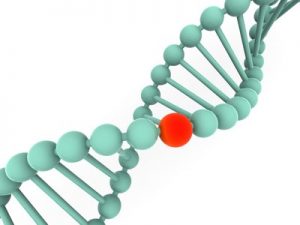What Is The Truth About Personalized Nutrition Testing? – Part 2
Author: Dr. Stephen Chaney
 When the human genome was sequenced in 2003, many of us in the scientific community thought we were on the verge of a revolution in human health and longevity. We would soon be able to tell individuals their risk of developing various diseases.
When the human genome was sequenced in 2003, many of us in the scientific community thought we were on the verge of a revolution in human health and longevity. We would soon be able to tell individuals their risk of developing various diseases.
Even better, we would be able to tell them the kind of diet and supplementation they needed to avoid those diseases. We would be able to personalize our nutritional recommendation for every individual based on their genome – something called nutrigenomics.
How naive we were! It has turned out to be much more complicated to design personalized nutrition recommendations based on someone’s genome than we ever imagined.
What Is Nutrigenomics?
 As a Professor at the University of North Carolina I specialized in cancer drug development for over 30 years. Over the last decade of my career a field called pharmacogenomics became widely accepted in the field of cancer drug development. In simple terms, pharmacogenomics looks at how an individual’s genes influence the effectiveness and side effects of drugs.
As a Professor at the University of North Carolina I specialized in cancer drug development for over 30 years. Over the last decade of my career a field called pharmacogenomics became widely accepted in the field of cancer drug development. In simple terms, pharmacogenomics looks at how an individual’s genes influence the effectiveness and side effects of drugs.
Because of pharmacogenomics, drugs today are being approved to target cancers for people whose cancer cells have a particular genetic makeup. These drugs would not have been approved a decade ago because if you test them on cancer in the general population, they have little or no effectiveness. They only work on a subset of people who have a form of cancer with a specific genetic makeup.
In principle, nutrigenomics is the same principle. You’ve heard for years that we all have unique nutritional needs. Now we are starting to learn why. It’s because we all have unique variations in our genetic makeup. These genetic mutations increase our risk of certain diseases, and they increase our needs for certain nutrients.
For example, mutations in the MTHFR gene increase the risk of certain birth defects, and supplementation with folic acid is particularly important for reducing birth defects in that population group.
Similarly, mutations in the vitamin D receptor, the VDR gene, interfere with vitamin D absorption from foods and are associated with a condition known as “vitamin D-resistant rickets.” Babies born with this genetic defect require mega doses of vitamin D for normal bone formation.
These are the best-established examples of gene mutations that affect nutritional needs. Many more gene-nutrient interactions have been proposed, but they have not been validated by follow-up experiments.
The situation is similar when we look at gene mutations associated with metabolic responses such as fat and carbohydrate metabolism, obesity, insulin resistance and type 2 diabetes. There are a few gene mutations that have strong associations with obesity and diabetes. Many more gene-metabolism interactions have been proposed, but the data are weak and inconsistent.
The Promise Of Nutrigenomics
 Now that you understand what nutrigenomics is and have some background information about it, let’s look at the promise of nutrigenomics. One promise of nutrigenomics is personalized supplement programs.
Now that you understand what nutrigenomics is and have some background information about it, let’s look at the promise of nutrigenomics. One promise of nutrigenomics is personalized supplement programs.
We all have different nutritional needs. Wouldn’t it be wonderful if someone could analyze your genome and provide you with a personalized supplement program that precisely fits your genetically determined nutritional requirements?
There are companies that offer such personalized supplement programs. Are they providing you with something of value or is their testing bogus? Are their supplements worthless?
Another promise of nutrigenomics is personalized diet advice. Some people seem to do better on low-fat diets. Other people do best on low-carb diets. Saturated fats and red meats may be more problematic for some individuals than for others. Wouldn’t it be wonderful if someone could analyze your genome and provide you with a personalized diet program – one that allows you to lose weight easily and gain vibrant health.
There are companies that will analyze your genome and tell you whether you are more likely to lose weight and be healthier on a low-fat or low-carbohydrate diet. Is their testing accurate or is it bogus? Are they providing you with useful information, or is their diet advice worthless?
The Problem With Nutrigenomics
 The short answer to the questions I posed in the previous section is that personalized supplement and diet programs are on the horizon, but we are not there yet. Companies promising you personalized nutrition programs based on DNA tests are misleading you. They quote a few studies supporting the tests they run and ignore the many studies showing their tests are worthless.
The short answer to the questions I posed in the previous section is that personalized supplement and diet programs are on the horizon, but we are not there yet. Companies promising you personalized nutrition programs based on DNA tests are misleading you. They quote a few studies supporting the tests they run and ignore the many studies showing their tests are worthless.
In case you think that is just my opinion, let me quote from some recent reviews on the current status of nutrigenomics.
For example, a review (C Murgia and MM Adamski, Nutrients, 366, 2017) published in 2017 concluded: “The potential applications to nutrition of this invaluable tool were apparent since the genome was mapped. The first articles discussing nutrigenomics and nutrigenetics were published less than a year after the first draft of the human DNA sequence was made available…However, fifteen years and hundreds of publications later, the gap between the experimental and epidemiologic evidence and health practice is not yet closed.”
 “The [complexity] of the genotype information is not the only factor that complicates this translation into practice. The discovery of other levels of control, including epigenetics [modifications of DNA that affect gene expression] and the intestinal microbiome, are other complicating factors. While the science of nutritional genomics continues to demonstrate potential individual responses to nutrition, the complex nature of gene, nutrition and health interactions continues to provide a challenge for healthcare professionals to analyze, interpret and apply to patient recommendations.”
“The [complexity] of the genotype information is not the only factor that complicates this translation into practice. The discovery of other levels of control, including epigenetics [modifications of DNA that affect gene expression] and the intestinal microbiome, are other complicating factors. While the science of nutritional genomics continues to demonstrate potential individual responses to nutrition, the complex nature of gene, nutrition and health interactions continues to provide a challenge for healthcare professionals to analyze, interpret and apply to patient recommendations.”
Another review (M Gaussch-Ferre et al, Advances in Nutrition, 9: 128-135, 2018 ) published in 2018 concluded: “Overall, the scientific evidence supporting the dissemination of genomic information for nutrigenomic purposes remains sparse. Therefore, additional knowledge needs to be generated…”
In short, the experts are saying we still don’t know enough to predict the best diets or the best supplements based on genetic information alone. Why is that? Why is it so complicated? In part, it can be explained by a term called penetrance. Penetrance simply means that the same gene mutation can have different effects in different people. In some people, its effects may be barely noticeable. In other people its effects may be debilitating.
What Is The Truth About Personalized Nutrition Testing?
Penetrance is not just a word. It’s a concept. What causes differences in genetic penetrance? Here are the most likely explanations.
- Human genetics is very complex. There are some gene mutations, such as those causing cystic fibrosis and sickle cell anemia, that can cause a disease by themselves. Most gene mutations, however, simply predispose to a disease or metabolic disturbance and are highly influenced by the activity of other genes. That’s because the products of gene expression form intricate regulatory and metabolic networks. When a single gene is mutated, it interacts with many other genes in the network. And, that network is different for each of us.
- Many common diseases are polygenic. That includes disease like heart disease, diabetes, and most cancers. Simply put, that means that they are not caused by a single gene mutation. They are caused by the cumulative effect of many mutations, each of which has a small effect on disease risk. The same appears to be true for mutations that influence carbohydrate and fat metabolism and affect nutrient requirements.
- The outcome of gene mutations is strongly influenced by our diet, lifestyle, and environment. For example, a common mutation in a gene called FTO predisposes to obesity. However, the effect of this mutation on obesity is strongest when it is coupled with inactivity and foods of high caloric density (translation: junk foods and fast foods instead of fresh fruits and vegetables). Simply put, that means most of us are genetically predisposed to obesity if we follow the American lifestyle, but obesity is not inevitable.
- Epigenetics has an important influence on gene expression. When I was a graduate student, we believed our genetic destiny was solely determined by our DNA sequence. That was still the prevailing viewpoint when the human genome project was initiated. We thought that once we had our complete DNA sequence, we would know everything we needed to know about our genetic destiny.
 How short sighted we were! It turns out that our DNA can be modified in multiple ways. These modifications do not change the DNA sequence, but they can have major effects on gene expression. They can turn genes on or turn them off. More importantly, we have come to learn that these DNA modifications can be influenced by our diet, lifestyle, and exposure to environmental pollutants.
How short sighted we were! It turns out that our DNA can be modified in multiple ways. These modifications do not change the DNA sequence, but they can have major effects on gene expression. They can turn genes on or turn them off. More importantly, we have come to learn that these DNA modifications can be influenced by our diet, lifestyle, and exposure to environmental pollutants.
This is the science we call epigenetics. We have gone from believing we have a genome (DNA sequence) that is invariant and controls our genetic destiny to understanding that we also have an “epigenome” (modifications to our DNA) that is strongly influenced by our diet, lifestyle, and environment and can change day-to-day.
- Our microbiome has an important influence on our health and nutritional status. Simply put, the term microbiome refers to our intestinal microbes. Our intestinal bacteria are incredibly diverse. Each of us has about 1,000 distinct species of bacteria in our intestines.
Current evidence suggests these intestinal bacteria influence our immune system, inflammation and auto-immune diseases, brain function and mood, and our predisposition to weight gain – and this may just be the tip of the iceberg.
More importantly, our microbiome is influenced by our diet. For example, vegetarians and meat eaters have entirely different microbiomes. Furthermore, the effect of diet on our microbiome is transitory. If you change your diet, the species of bacteria in your microbiome will completely change in a few weeks.
Finally, our microbiome also influences our nutritional requirements. For example, some species of intestinal bacteria are the major source of biotin and vitamin K2 for all of us and the major source of vitamin B12 for vegans. Intestinal bacteria may also contribute to our supply of folic acid and thiamine. Other intestinal bacteria inactivate and/or remove some vitamins from the intestine for their own use. Thus, the species of bacteria that populate our intestines can influence our nutritional requirements.
Now that you know the complexity of gene interactions you understand why we are not ready to rely on DNA tests yet. We don’t yet know enough to design a simple DNA test to predict our unique nutritional needs. That science is at least 10-20 years in the future. Companies that tell you otherwise are lying to you.
My Recommendations for Supplements and Foods
Here are my recommendations for how to decide which foods or supplements you should eat:
 Think of DNA testing as only the first step in the process of learning which foods and supplements are best for you. Since DNA testing is not definitive by itself, I wouldn’t recommend spending thousands of dollars on a DNA test.
Think of DNA testing as only the first step in the process of learning which foods and supplements are best for you. Since DNA testing is not definitive by itself, I wouldn’t recommend spending thousands of dollars on a DNA test.- Next, start with diets that we know are healthy long-term. As I discussed in my book, “Slaying The Food Myths,” any primarily plant-based diet ranging from vegan to Mediterranean and DASH diets is likely to be healthy long-term. If you find you need a low carb diet, I recommend the low-carb version of the Mediterranean diet.
- Don’t eliminate plant food groups like fruits, whole grains, or legumes from your diet unless you have an objective reason to do so (more about that below).
- Learn to listen to your body. Keep track of the foods and/or supplements you eat and how they make you feel.
- In terms of listening to your body, start with your digestive system. I have vegan friends who experience constant gas and bloating and think of it as a badge of honor. I have keto friends who experience constant constipation and think of it as a badge of honor. Neither is correct. That is just their body telling them the diet they are eating is not right for them. Here is the process I recommend:
- Start by trying the various plant-based diets for 4 to 6 weeks until you find the one that works best for you. For example, when I tried that approach it became clear that a vegan diet was not for me. I discovered I do much better on a semi-vegetarian diet.
- If you are still experiencing digestive issues, start paying more attention to the foods you are eating. If you keep a log of the foods you eat and when you experience digestive issues for a few weeks, you will likely be able to identify foods that are problematic for you. Once you have done that, eliminate them from your diet for a few weeks and then go back and do a food challenge test where you add that food back to your diet to confirm that it is a problem for you.
- If all this fails, I recommend an elimination diet or FODMAP diet to identify foods to avoid (You can find instructions for both on the internet). [Note: Skin tests are notoriously unreliable, but they may give you some clues about foods to avoid that you could confirm with a food challenge.]
- Finally, if digestive issues persist, you should make an appointment with your doctor.
- Also, pay attention to blood sugar control following the same approach I outlined for digestive issues.
- Symptoms of high blood sugar are fatigue, thirst, headache, trouble concentrating, and frequent urination.
- Symptoms of low blood sugar are hunger, shakiness, anxiety, irritability, feeling lightheaded, and sleepiness.
- Biomarkers of disease, like LDL cholesterol, HDL cholesterol, triglycerides, c-reactive protein (a measure of inflammation), and HbA1c (a measure of blood sugar control), can be useful indicators of whether a diet or supplement is right for you. However, you should interpret improvements in disease biomarkers with caution because they can be misleading when you have been following a diet or supplement program for a short time.
Any diet that results in rapid weight loss will improve disease biomarkers in the short term. Similarly, some supplement programs give a transitory improvement in disease biomarkers. It is only when a diet or supplement program has been followed for 5, 10, or 20 years that disease biomarkers become truly reliable indicators of the success or failure of that diet or supplement program.
- Finally, feelings of well-being, energy, mood, and clarity of thinking are subjective and highly susceptible to the placebo effect. They are the least reliable indicators of the success or failure of a food or supplement program.
The Bottom Line
Nutrigenomics is defined as the interaction between our genetic makeup and our diet. How far have we advanced in the science of nutrigenomics? Can a simple DNA test provide us with useful information?
For example, we all have different nutritional needs. Wouldn’t it be wonderful if someone could analyze your genome and provide you with a personalized supplement program that precisely fits your genetically determined nutritional requirements?
There are companies that offer such personalized supplement programs. Are they providing you with something of value or is their testing bogus? Are their supplements worthless?
There are companies that will analyze your genome and tell you whether you are more likely to lose weight and be healthier on a low-fat or low-carbohydrate diet. Is their testing accurate or is it bogus? Are they providing you with useful information, or is their diet advice worthless?
Two recent reviews have surveyed the nutrigenomic literature (all published clinical studies) and have concluded that we still don’t know enough to predict the best diets or the best supplements based on genetic information alone. Why is that? It is because:
- Human genetics is very complex.
- Many common diseases are polygenic (caused by the cumulative effect of many mutations).
- The effect of gene mutations on our health and wellbeing is strongly influenced by our diet, lifestyle, and environment.
- Epigenetics has an important influence on gene expression.
- Our microbiome has an important influence on our health and nutritional status.
For more details and my personal recommendations on how to determine the best diet and supplement program for you, read the article above.
These statements have not been evaluated by the Food and Drug Administration. This information is not intended to diagnose, treat, cure or prevent any disease.
